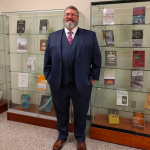Jari Eloranta is Professor of Economic History at the University of Helsinki. He specializes in comparative economic history, especially the roles played by states as well as conflicts and crises in history. He is currently the Secretary-General of the International Economic History Association and the Editor of the monograph series Perspectives in Economic and Social History (Routledge).
 Sanna Erkamo is a Doctoral Student in the Doctoral Program in Social Sciences, in the discipline of Social and Public Policy. In her dissertation she utilizes both statistical and qualitative methods to examine the relationship between climate change contrarianism, social identities and cultural context in Europe.
Sanna Erkamo is a Doctoral Student in the Doctoral Program in Social Sciences, in the discipline of Social and Public Policy. In her dissertation she utilizes both statistical and qualitative methods to examine the relationship between climate change contrarianism, social identities and cultural context in Europe.

Timo Häkli is a Doctoral Student in the Doctoral Programme in Social Sciences, in the discipline of Social Psychology. In his research Timo explores the socially shared meanings attached to food in contemporary society. More specifically, drawing from social representations theory, he explores how topical debates about climate change, public health and animal ethics contest the established social representations of eating meat.

Tuuli Holttinen (PhD) is a Doctoral Education Planning Officer in the Doctoral School in Humanities and Social Sciences at the University of Helsinki. She is responsible for managing and coordinating the Annual Conference together with the Conference Coordination Committee.
 Ryan Ingerick is a Doctoral Student in the Doctoral Programme in Political, Societal and Regional Change, in the discipline of Economic and Social History. His dissertation compares the social and economic dimensions of indentured servitude in the Nordic States and the British Empire in the 17th and 18th centuries, and will discern how much influence British unfree labour had on empire building in the Kingdoms of Sweden and Denmark.
Ryan Ingerick is a Doctoral Student in the Doctoral Programme in Political, Societal and Regional Change, in the discipline of Economic and Social History. His dissertation compares the social and economic dimensions of indentured servitude in the Nordic States and the British Empire in the 17th and 18th centuries, and will discern how much influence British unfree labour had on empire building in the Kingdoms of Sweden and Denmark.
 Eeva Luhtakallio is Professor of Sociology at the University of Helsinki. She is specialized in political and visual sociology, as well as social theory and comparative research. Her work focuses on democracy and citizenship as mundane practices, including studies on activism, young people’s political engagements and political marginalization. Luhtakallio leads the Centre for Sociology of Democracy.
Eeva Luhtakallio is Professor of Sociology at the University of Helsinki. She is specialized in political and visual sociology, as well as social theory and comparative research. Her work focuses on democracy and citizenship as mundane practices, including studies on activism, young people’s political engagements and political marginalization. Luhtakallio leads the Centre for Sociology of Democracy.
 Eemil Mitikka is a Doctoral Student in the Doctoral Programme in Political, Societal and Regional Change, in the discipline of Russian and Eurasian Studies. His research deals with the relationship between political participation and autocracy in post-Soviet Russia and more generally in post-Soviet countries.
Eemil Mitikka is a Doctoral Student in the Doctoral Programme in Political, Societal and Regional Change, in the discipline of Russian and Eurasian Studies. His research deals with the relationship between political participation and autocracy in post-Soviet Russia and more generally in post-Soviet countries.

Valeria Peshko is a Doctoral Student in the Doctoral Programme in Political, Societal and Regional Change, in the discipline of Economic and Social History. Her PhD project is dedicated to female executives in 19th-century Russian family firms. She examines implications of class, gender and religion on their business practice, based on a case study of three women from Morozov family, whose enterprises played a leading role in textile industry.
 Marianne Sandelin is a Doctoral Student in the Doctoral Programme in Political, Societal and Regional Change, in the discipline of Political History. In her dissertation, she explores the philosophical and intellectual historical roots of European conservatism by examining the political philosophy of Joseph de Maistre and his paradoxical relationship with universalism.
Marianne Sandelin is a Doctoral Student in the Doctoral Programme in Political, Societal and Regional Change, in the discipline of Political History. In her dissertation, she explores the philosophical and intellectual historical roots of European conservatism by examining the political philosophy of Joseph de Maistre and his paradoxical relationship with universalism.

Åsa von Schoultz is Professor of Political Science at the University of Helsinki. She specializes in political behavior of citizens and political elites, and has a particular interest in electoral competition within parties, perceptions of democratic processes and minority politics. von Schoultz is the Director of the Finnish National Election Study.
 Maija-Eliina Sequeira is a Doctoral Student in the Doctoral Programme in Social Sciences, in the discipline of Social and Cultural Anthropology. Her research uses methods from anthropology and developmental psychology to determine how children in Helsinki learn and enact social hierarchies, and to explore how their understandings of hierarchies are shaped by norms and values found in their socio-cultural environment(s).
Maija-Eliina Sequeira is a Doctoral Student in the Doctoral Programme in Social Sciences, in the discipline of Social and Cultural Anthropology. Her research uses methods from anthropology and developmental psychology to determine how children in Helsinki learn and enact social hierarchies, and to explore how their understandings of hierarchies are shaped by norms and values found in their socio-cultural environment(s).
